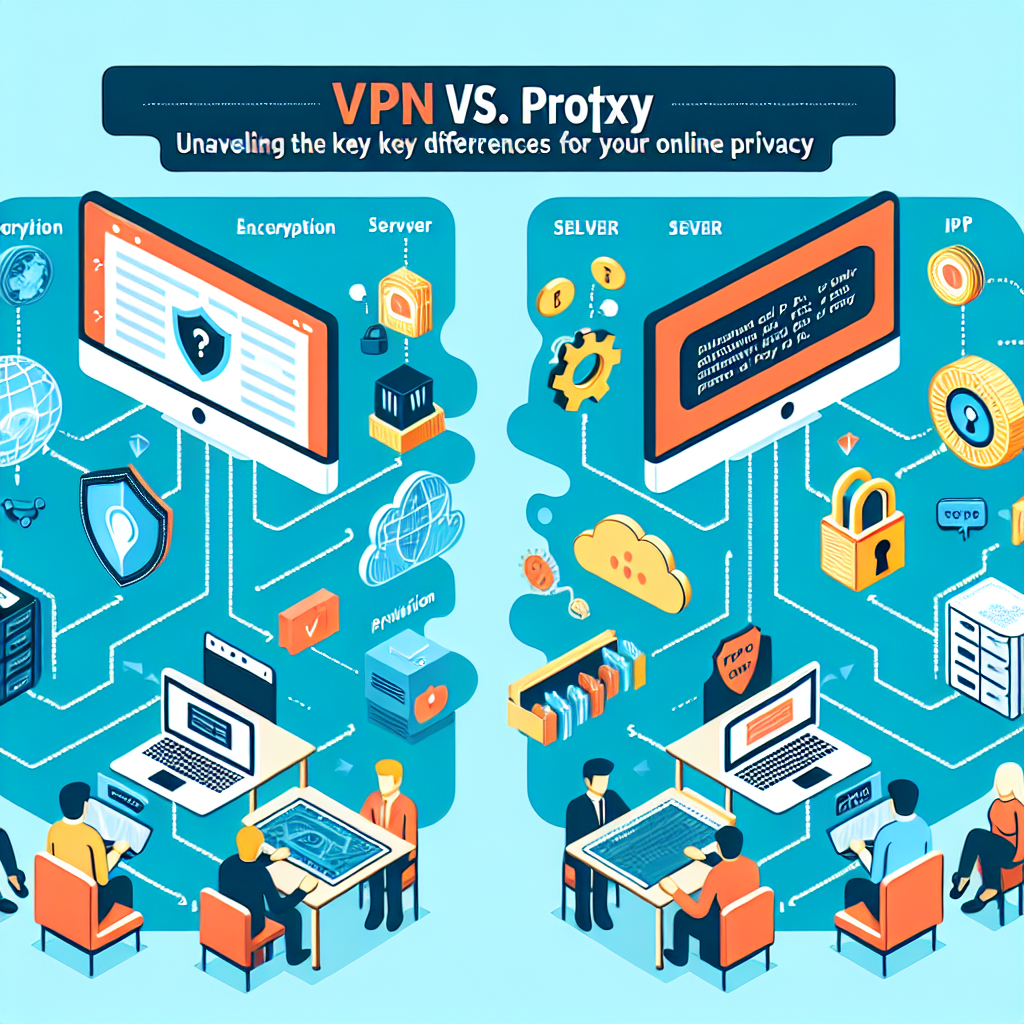As the internet becomes an integral part of our daily lives, concerns about online privacy and data security continue to grow. Two popular tools that users employ to enhance online privacy are Virtual Private Networks (VPNs) and proxy servers. Although they may seem similar at first glance, they serve different purposes and offer distinct functionalities. This article will explore the key differences between VPNs and proxies, enabling you to make an informed choice about which tool best serves your online privacy needs.
Understanding VPNs
What is a VPN?
A Virtual Private Network (VPN) creates a secure and encrypted connection between your device and the internet. By routing your internet traffic through a remote server operated by the VPN provider, a VPN masks your IP address and encrypts your data, safeguarding your online activities from prying eyes.
Key Features of VPNs
Encryption: VPNs utilize strong encryption protocols, such as OpenVPN, L2TP/IPsec, and IKEv2/IPsec, to secure your internet traffic. This makes it extremely difficult for third parties, including hackers and government agencies, to intercept your data.
IP Address Masking: By connecting to a VPN server, your real IP address is hidden, and your internet traffic appears to originate from the VPN server’s IP address. This helps maintain anonymity and can be useful for bypassing geo-restrictions.
Comprehensive Security: VPNs can protect all of your internet-connected applications, meaning that all data transferred to and from your device is encrypted and secure.
Use Cases for VPNs
- Enhanced Privacy: VPNs are ideal for users looking to maintain their anonymity online and protect sensitive data, especially when using public Wi-Fi networks.
- Bypassing Censorship: In countries with internet censorship, VPNs enable users to access blocked websites and services.
- Streaming Content: VPNs can help users bypass regional restrictions on services like Netflix, Hulu, and BBC iPlayer, granting access to a broader range of media content.
Understanding Proxies
What is a Proxy?
A proxy server acts as an intermediary between your device and the internet. Instead of connecting directly to a website, you connect to the proxy server, which in turn fetches the content on your behalf. While proxies can help with anonymity, they do not provide the same level of security and privacy as VPNs.
Key Features of Proxies
IP Address Masking: Like VPNs, proxies mask your real IP address. However, since not all proxy servers encrypt your data, users may remain vulnerable to interception.
Varied Types of Proxies: There are several types of proxies, including HTTP proxies, SOCKS proxies, and transparent proxies, each serving specific functions and use cases.
Limited Security: Most proxies do not encrypt your internet traffic, meaning that your data can be exposed, especially on unsecured connections.
Use Cases for Proxies
- Web Scraping: Proxies can be used to collect data from websites without revealing the user’s identity.
- Bypassing Geo-blocks on Specific Content: Proxies are commonly used to access region-restricted content, particularly in cases where encryption is not a priority.
- Basic Anonymity: While proxies can hide your IP address, they do not provide comprehensive security, and their effectiveness varies greatly depending on the provider.
Key Differences Between VPNs and Proxies
1. Security and Encryption
- VPNs: Offer robust encryption options which secure all internet traffic, ensuring higher levels of privacy and data security.
- Proxies: Generally lack encryption, leading to potential data exposure, especially on insecure networks.
2. Scope of Functionality
- VPNs: Can protect all applications on your device, making them versatile for streaming, browsing, and online activities in general.
- Proxies: Typically work at the application layer, meaning they only handle traffic for specific applications or browsers.
3. Connection Speed
- VPNs: Often slower due to the added layer of encryption, though optimized services can provide satisfactory speeds.
- Proxies: Usually offer faster speeds because they do not encrypt data, but this comes at a cost to security.
4. Anonymity Level
- VPNs: Provide a higher level of anonymity through IP masking and strong encryption, making it difficult to track user activities.
- Proxies: Offer a basic level of anonymity through IP masking but can be less secure and are easier to trace.
Conclusion
Choosing between a VPN and a proxy largely depends on your online privacy needs. If you’re looking for enhanced security, data encryption, and comprehensive privacy, a VPN is the more suitable option. For users requiring simple IP masking for specific tasks without the need for strong security protocols, a proxy might suffice. Understanding these critical differences will empower you to make informed decisions about your online activities and how best to protect your personal information.
[ad_2]If you’re intrigued by online privacy tools, you might find it worthwhile to explore more about how they function. For a deeper understanding of how a Virtual Private Network (VPN) encrypts your internet traffic, the Wikipedia page offers comprehensive insights. Additionally, if you’re curious about various types of proxy servers and what makes each unique, there’s a detailed overview available. Finally, learning about IP addresses and how they relate to both VPNs and proxies might give you a broader perspective on the significance of online anonymity and security.





